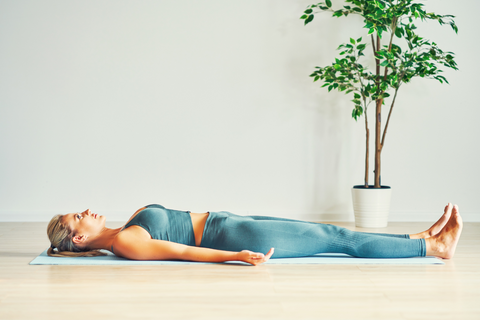5 Mindfulness Tools That Will Quickly Lower Your Stress
•Posted on December 12 2022

December is here and unfortunately, so is holiday stress!
Holiday stress can be caused by a variety of factors, including:
- Trying to balance a busy holiday schedule
- Feeling pressure to make the season perfect
- Financial pressures
- Expectations of family and friends
Additionally, it can be caused by unresolved family issues or unresolved grief.
This is why using mindfulness-based techniques can be powerful tools in keeping your body balanced despite added stress from the holidays.
Before jumping into ways to reduce holiday stress, let's briefly go over what mindfulness means and how mindfulness techniques can reduce stress.
What is Mindfulness?

Mindfulness is a psychological practice that involves being aware of the present moment in a non-judgmental way.
It involves focusing on one’s thoughts, feelings, and bodily sensations, and observing them without trying to change them.
Mindfulness can help to reduce stress and anxiety, improve concentration, and create a greater sense of wellbeing.
Mindfulness is a practice that can be used in many different settings, from formal meditation to everyday activities.
It should be noted that mindfulness alone, is different from Mindfulness Based Stress Reduction (MBSR).
Recommended for You:

Mindfulness Based Stress Reduction is a specific program designed to help people learn how to manage stress, pain, and illness through the practice of mindfulness.
The program combines mindfulness meditation and yoga to help people become more aware of their thoughts, feelings, and behaviors, and learn to respond to stress with greater awareness and acceptance.
MBSR is based on the teachings of Buddhist meditation and can be used as an adjunct to traditional medical treatments.
How Can Mindfulness Reduce Stress?

Mindfulness techniques can help to reduce stress in several ways:
- By paying attention to the present moment without judgment, it can help to reduce worrying, ruminating, and overthinking.
- Focusing on calming and grounding activities, such as mindful breathing and meditation.
- Creating a greater sense of self-awareness, which can lead to healthier coping strategies for dealing with stress.
- Cultivating acceptance and compassion for oneself, further reducing stress.
Related Post: Can Magnesium Help Improve Your Mood?
Now that you have a better understanding of how mindfulness works, read on to learn five mindfulness tools that will quickly lower your stress so you can enjoy the holiday season to the fullest.
1. Mindful Breathing

With mindful breathing, you focus on the breath and the sensations associated with it.
This can help to bring awareness to the present moment and reduce stress.
To practice mindful breathing, find a comfortable position with your eyes closed and your spine straight.
Then, focus your attention on your breath and the sensations associated with it.
Related Post: What Essential Oils Can Help Improve Anxiety?
Notice the sensations in your chest, stomach, and other areas of your body.
As you inhale and exhale, take note of the air flowing in and out of your body.
You can also practice mindful breathing while engaging in other activities such as walking.
2. Mindful Meditation

Sitting still and focusing on the breath, body, and environment can help reduce stress and improve concentration.
Here's how to practice mindful meditation:
Add a couple of drops of organic peppermint essential oil to your favorite essential oil diffuser and turn it on.
Find a comfortable position with your eyes closed and your spine straight.
Then, focus your attention on your breath and the sensations associated with it.
Notice the sensations in your chest, stomach, and other areas of your body.
When your mind wanders, gently bring it back to the present moment.
You can practice mindful meditation for five minutes or longer, depending on your preference.
Recommended for You:
3. Guided Imagery

Guided imagery consists of visualizing a peaceful and calming environment that can help to reduce stress and improve overall wellbeing.
To practice guided visualization, find a comfortable position with your eyes closed and your spine straight.
You may enjoy sitting in a warm, soothing epsom salt and lavender bath to help you get grounded for this exercise.
Then, imagine a peaceful and calming environment.
This could be a beach, a mountain, a forest, or any other place that brings you a feeling of peace.
Allow yourself to explore this environment, noticing the sights, sounds, smells, and other sensations associated with it.
Recommended for You:

4. Body Scans

With a body scan, you are gradually scanning the body to become more aware of physical sensations and reducing stress.
Below is a body scan exercise you can try that incorporates our natural magnesium oil spray for relaxation:
Start by spraying some of the oil on your wrists, stomach and the soles of your feet.
Then, take a few moments to focus on your breath and the sensation of the oil on your skin.
Recommended for You:
As you inhale and exhale, notice any changes in the sensations and how your body responds.
Finally, take a few moments to focus on the present moment and be aware of your thoughts and emotions.
You can practice this for a few minutes or longer.
5. Mindful Stretching

Focusing on the sensations of each movement while stretching can help to reduce stress and improve flexibility.
Mindful stretching can look like slowly moving your body into gentle stretches and focusing your attention on the sensations in each movement.
Notice how your body feels as you move and how it responds to the stretching.
As you move, be aware of any tightness or resistance in your body and allow the breath to move through it.
Take your time with each stretch and when you are finished, take a few moments to notice any changes in your body.
Using Mindfulness for Long Term Stress Relief

Ultimately, mindfulness exercises can be a powerful tool to reduce stress, anxiety, and other negative emotions.
Mindful breathing, meditation, guided imagery, body scans, mindful stretching, are all examples of mindfulness-based activities that can help to reduce stress and create a sense of calm and wellbeing.
By focusing on the present moment and being aware of physical sensations, thoughts, and emotions, you can learn to respond to stress in a more mindful, compassionate, and accepting way.
Comments
0 Comments
Leave a Comment